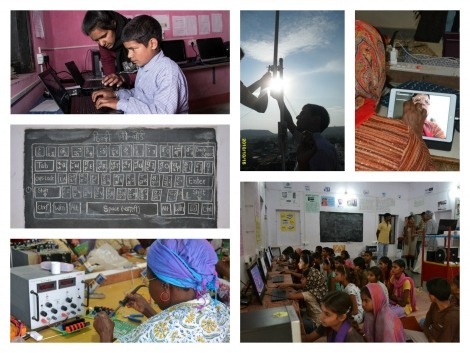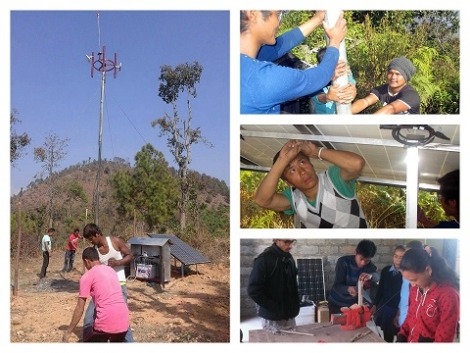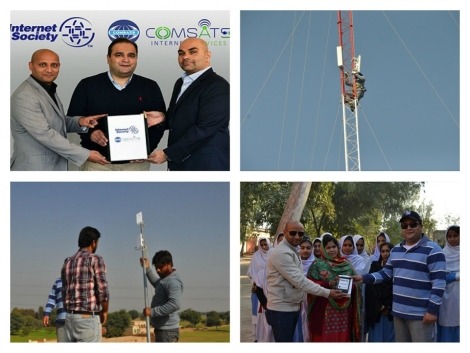Wireless for Communities
Wireless for Communities (W4C) is an award-winning program initiated in 2010 by the Internet Society Asia-Pacific Bureau. It provides last mile connectivity to rural and remote areas of the Asia-Pacific using wireless technologies.
The program adopts a holistic approach to empowering communities with digital skills and tools – the wireless networks are managed by the community for the community, and relevant usage of the Internet are introduced through training. The program started in a village in India, and has now expanded to 146 access points throughout India. In 2015, W4C in Nepal and Pakistan were launched, and rapidly expanding.
The W4C program aims to:
- Provide Internet connectivity by utilizing low-cost Wi-Fi-based equipment to connect and empower rural and underserved communities.
- Address the lack of content, products and services originating from rural areas, which prevents economic benefits from percolating to the bottom of the pyramid.
The program is comprised of three main components:
- The community receives training on how to establish community wireless networks. Communities are empowered via a structured Training of Trainers program that equips participants with the information they need to design, deploy and operate wireless networks. This helps build a pool of local experts, who in turn can train community members.
- The deployment of wireless network infrastructure in rural locations. The technology used is Wi-Fi, which is generally structured in a wireless-mesh-type configuration for redundancy and reach, providing access in and around a community (usually a village).
- Broadening Internet access and usage in existing locations by expanding Wi-Fi connectivity to surrounding areas. Community workshops to enable local Internet users to create content and services online, and learn digital literacy skills are also carried out.
India
In 2010 the program was piloted in the traditional weaving village of Chanderi in Madhya Pradesh. In 2018, W4C had established over 250 networks across India.
Overview and Approach

The W4C program started in India in 2010, in partnership with the Digital Empowerment Foundation.
The program in India was piloted in the traditional weaving village of Chanderi in Madhya Pradesh. In 2018, W4C had established over 250 networks across India.
The program uses line-of-sight methods, wireless technologies, low-cost Wi-Fi equipment and unlicensed spectrum – 2.4 GHz and 5.8 GHz – to create community-owned and community-operated wireless networks in rural and remote locations of India to democratize Internet access and make it available to all.
To develop the capacity of community members, W4C in India provides training to “Barefoot Engineers” to set up and manage the wireless networks, and also to train others in their community. W4C in India also offers training on digital literacy and content development to community members.
Inspired by the W4C’s wireless ecosystem, several initiatives have emerged, including the Wireless Women for Entrepreneurship and Empowerment initiative that promotes Internet-based social enterprises and entrepreneurship among women, as change agents for social and economic empowerment.
In India, the Wireless for Communities and Open Spectrum Summit was organized in 2011, 2012, 2013 and 2014, bringing together policy experts and field practitioners to discuss ways that wireless technologies and unlicensed spectrum can be used to extend connectivity to India’s remote regions.
Achievements and Impact
The W4C program in India is comprised of six phases.
Phase 1: Pilot in Chanderi village, Madhya Pradesh (2010-2011)
- Developed a model wireless community network that is replicated in the future phases of the W4C program.
- Enabled communities’ access to the Internet through the Chanderi Weavers Information Resource Centre, which has helped to create new weaving design patterns and enhance the Chanderiyaan e-commerce platform to market local produce and handicrafts of Chanderi.
- Provided Internet connectivity in schools, local government offices, business premises, a health centre and a community radio station.
- Conducted training of trainers workshops in establishing and operating wireless networks, and in using the Internet for community development. Some of the trainees became trainers in the subsequent phases when the program was expanded to other villages.
- Weavers have reported 20-40% growth in their income.
- Completed an impact assessment and impact analysis of the first phase.
Phase 2: Program expansion and South Asia outreach (2011-2012)
- Introduced the W4C to Bangladesh and Bhutan through training of trainers workshops.
- Deployed wireless networks in Tura in Meghalaya, and Baran and Tilonia in Rajasthan.
- Connected 10 community information resource centres in Baran.
- Connected Barefoot College and the community radio station in Tilonia.
- Organized the first W4C Summit in 2011 during the 8th Manthan Award South Asia Annual Digital Festival in New Delhi to raise awareness and share experience on wireless community networks in India and South Asia.
Phase 3: Further expansion of the W4C program and focus on capacity building to develop relevant online content and services (2012-2013)
- Deployed wireless networks in another three communities – Giridih in Jharkand, Mandla in Madhya Pradesh and Nangaon in North Tripura.
- Conducted 24 training workshops in targeted communities from previous and current phases on digital literacy, e-health, e-learning, and information and communication technology (ICT) for rural entrepreneurship.
- Published a casebook to share the W4C experience in India.
Phase 4: Wireless Women for Education and Empowerment (2014-2015)
- Supported 50 women in five communities to create Internet-based social enterprises that are owned and managed by women.
- Five communities selected include Baran in Rajasthan, Chanderi and Shivpuri in Madhya Pradesh, Ranchi in Jharkhand, and Tura in Meghalaya.
- Women participated in a six-month training to develop their online skills to run their enterprises. They were also provided with hardware, software and wireless Internet access for their enterprises.
- Developed a website to document the women’s stories.
- Many of the women established and managed their own community information resource centres.
- Many women also became trainers and trained women and girls in their own villages. In Chanderi, 4,000 women and girls were trained this way.
- Published a second casebook to share the W4C experience in India.
Phase 5: Inter-networking of networks (2015-2016)
- Connected three separate community networks to each other through the intranet to share local content with each other.
- Target locations included Baran in Rajasthan, and Guna and Shivpuri in Madhya Pradesh.
- Leveraged backhaul Internet connectivity from one location to connect other locations.
- Built technical capacity of local community in wireless networking.
Phase 6: Smart Village Program (2016-2017)
- Selected Tham in Jharkhand and Narayanpet in Telangana to implement this Smart Village Program.
- Established a Digital Smart Village Resource Centre in each location with broadband connection. These centres are managed by the local community.
- Enhanced the capacity of local government operations and developed the entrepreneurial skills of the local community through the use of ICTs.
- Connected schools, local government offices and self-help groups to broadband.
Partnerships
Other partners that have contributed to W4C in India include Ericsson, Ford Foundation, Microsoft, Media Lab Asia, Nokia, Tata Trusts, Vodafone Foundation, the Government of India’s Ministry of Communication and Information Technology, and other organizations.
Nepal
The W4C program in Nepal was launched in the aftermath of the Gorkha Earthquake in April 2015, in partnership with the Nepal Wireless Networking Project, an initiative of Mahabir Pun, awardee of the Magsaysay Award and Internet Society’s Jonathan B. Postel Service Award.
Overview and Approach
Site Selection

The Nepal Wireless Networking Project was leading the restoration of information and communication technology systems in grassroots communities after the Gorkha Earthquake. The team travelled to devastated areas, at times by motorbike or on foot to survey rural towns, noting down the GPS coordinates of damaged schools, mobile towers and other infrastructure. The data that the team collected was used to draft a preliminary implementation plan for wireless network rollout, in consultation with the management committees of the local villages, health centres and schools.
All of the sites chosen are remote villages, with the population deriving much of their income from subsistence farming. Cut off from the national power grid, some villages draw electricity from community-built micro-hydrogenerators, while others have basic solar power systems. While increased mobile network coverage has made 2G and 3G Internet service available to urban and peri-urban areas, and WiMax to some rural communities, the villages chosen have not had access to broadband Internet prior to the W4C program.
Capacity Building
A series of technical and digital literacy workshops were held from the first day and throughout the network deployment period, to not only enable community members to use the Internet meaningfully, but also to keep the wireless networks running smoothly without much need for external assistance.
Achievements and Impact
In the first phase, the program built wireless networks, all powered by solar panels, and connected 12 schools and 3 health clinics in 14 villages in Gorkha, Lamjung and Sindhupalchok districts. The community clinics are now connected to the Kathmandu Model Hospital, which provides telemedicine services to rural areas.
Shared devices were provided to some of the access points to aid Internet adoption in the target communities – health clinics in Barpak and Bhichuk were furnished with a laptop each, while several newly connected schools were given six low-powered personal computers. The latter function as servers for Nepalese-language educational content and an e-library of 7,000 books developed by Open Learning Exchange Nepal. Gorkha Foundation, a US-based non-profit run by Nepali expatriates from Gorkha has pledged to donate 10 computers each to 25 schools in the Gorkha district.
To encourage technical and scientific innovation among youth, the W4C program established Rural Innovation Labs in three of the villages. These labs provide mechanical and electronic tools, as well as the space for community members to build and experiment with technology.
The W4C program in Nepal is planning for the next phase to expand the program and work with targeted communities to introduce relevant online content and services. The plan is to build the community’s capacity to use the Internet for e-agriculture, e-banking, e-learning, e-health and rural innovation.
Partnerships
The Nepal Wireless Networking Project was licensed by the Nepal Telecommunication Authority to deploy wireless networks and provide Internet services to rural areas in the country. This contributed greatly to the rapid establishment of wireless networks in the targeted villages, with minimal bureaucratic hurdles. Various partners also had a hand in the rollout, including WorldLink Communications that helped with installing the Wi-Fi hot spots and the network management server, and provided discounted Internet bandwidth. Lumbini Net, assisted in laying out the backhaul line in Gorkha. The local community, which owns an FM radio station in Satipipal, lent its tower to the W4C program to establish a base station on its premises free of charge.
Pakistan
The W4C program in Pakistan was launched in December 2015, in partnership with COMSATS Internet Services (CIS).
Overview and Approach

The W4C program in Pakistan was launched in December 2015, in partnership with COMSATS Internet Services (CIS). Propakstani reported on the event.
CIS is a pioneer Internet service provider in Pakistan offering diversified services like wireless broadband, domain and web hosting, data centre services, website designing and development, IT training, and Internet-related research facilities. Other community-based projects that CIS has been involved in include the establishment of telehealth centres in rural Pakistan.
In Pakistan, the W4C program was piloted in Chak Faiz, a rural community in Multan, Punjab province of Pakistan. The community had limited access to the Internet and it was not being used for any activities as part of their daily lives. The W4C program built the capacity of community members to set up their own wireless Internet connections for the community. The program also distributed tablets to schools and families. In addition, the W4C team visited schools in the village and organized awareness raising sessions for the schoolchildren on how they could use the Internet to enhance their learning.
Achievements and Impact
The first phase of establishing Internet connectivity was completed in December 2015, benefitting at least 400 students in the village. This pilot initiative has been a success and initial reports show that community members are actively using the Internet.
In addition, the W4C program established broadband Internet access for the PAK German Polytechnic Institute for Agricultural Technology in Chak Faiz to enhance teaching, learning and administration at the institute.
The next phase is focused on training the community on the use of the Internet to improve their livelihood and wellbeing. Replication of this model to other villages in Pakistan is also being planned.
News
Build The Internet: Training Barefoot Network Engineers
How You Can Help Connect The Planet
Connecting the unconnected: Experience from the First Phase of our W4C Project in Pakistan
Diversity the Key to Connecting the Last Mile
A journey through digital empowerment in rural India
Resources
A Pilot Community Network in Pakistan: Online Supplementary Education and its Impact
Community Networks: Regulatory issues and gaps – Experiences from India
4th Wireless for Communities & Open Spectrum Summit Report
Barefoot & Connected: Socio-behavioural impact of wireless broadband & digital intervention in a village campus
Connecting Remote Communities: Wireless for Communities in India
Wireless for Communities: A Case Book
Archives
The resources below have been archived. You can find their archived versions on Web Archive links:
- Wireless for communities in India: an overview
- Wireless for Communities Program
- Connecting the unconnected one village at a time (W4C Map)
- Wireless Training Manual
- Wireless for Communities in India: Phase 1 Impact Assessment Report
- Wireless for Communities in India: Phase 1 Impact Study Analysis
- Wireless for Communities in India: Phase 2 Report
- Wireless for Communities in India: Phase 3 Report
- Wireless for Communities in India: Phase 4 Report
- Wireless for Communities in India: Phase 6 Report
- Rural ISPs needed to expand Internet access in India
- Wireless For Communities (W4C) – Best of a breed
- Access in India and the Digital India promise
- Wireless for Communities in Nepal: Status Report – May 2016
- Internet Society Launches Wireless for Communities (W4C) Pilot Project in Pakistan